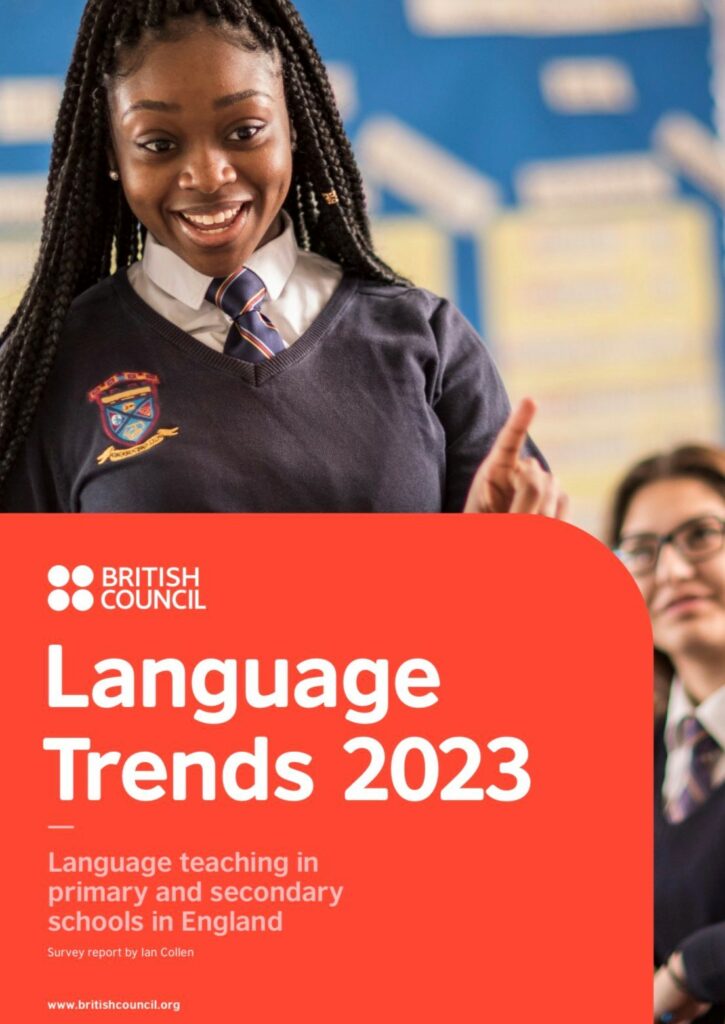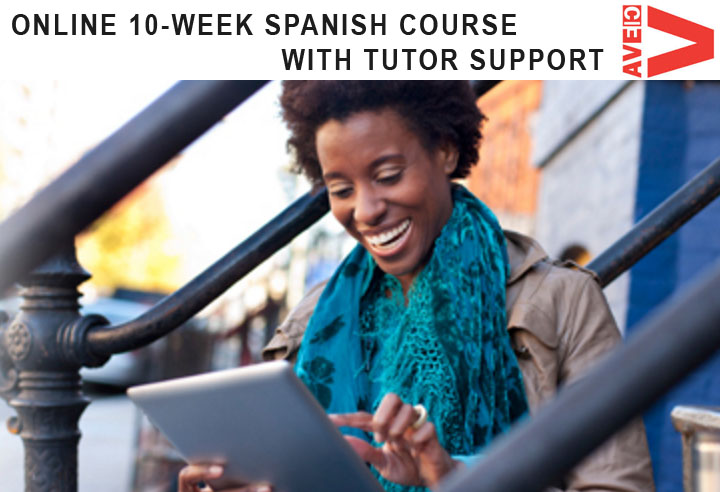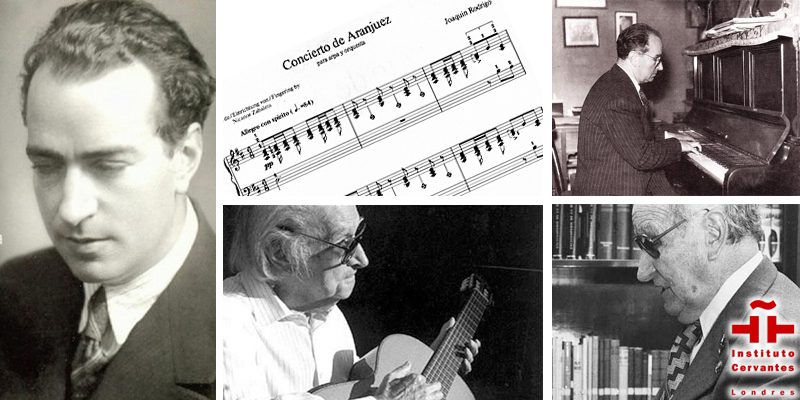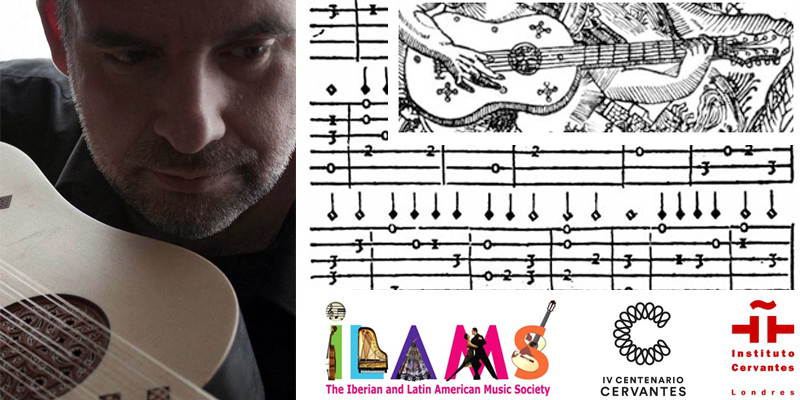Spanish is the most popular A-level language in schools across England for the fourth year running
The British Council presented today the results of the Language Trends England 2023 report.
- For the fourth year running, Spanish continues to have the highest number of A-level entries.
- Official exam data show that, for the fourth year running, Spanish is the most popular language at A-level, replacing the long-standing tradition of French being in the top spot. The diverging trends noted in the graph below would suggest that Spanish now has the highest A-level entries and it is predicted that this trend will continue in future cohorts. It is interesting to recall that French continues to be the most taught language in primary schools.

- The three most popular languages on the school curriculum in England are French, German and Spanish.

- French continues to be the most popular language at Key Stage 3 (ages 11-14), taught in 87 per cent of responding state schools and 97 per cent of responding independent schools, followed closely by Spanish in 75 per cent and 93 per cent of state and independent schools respectively.
- French, German and Spanish remain the ‘big 3’ curricular languages; with planned revisions to the GCSE specifications in these languages to take place from 2024, there are exciting times ahead in the study and research of future language trends in England.
Read the whole Language Trends England 2023 report here.
Learn to connect, connect to learn.
Learning a new language expands your world.
connects you with more people, more opportunities
and opens up new doors, pathways and challenges
Because learning a language is more than just earning a certificate:
It is discovering how being understood makes you a part of things;
It is understanding how to reach the hearts of others.
Instituto Cervantes, 30 years dedicated to making Spanish
a greater, more universal language
connecting more and more people.
Now, all our experience, and our highly qualified teachers,
are available in our on-line courses.
Taking Spanish to every corner of the world
and your heart to wherever it desires.
Instituto Cervantes.
Learn to connect,
connect to learn.
#InstitutoCervantesenlínea
William Frost: «I think Spanish is a wonderful language and I feel like it is the most useful language to be learning right now»

William Frost is originally from Shrewsbury, but now he lives in Canterbury. He has moved around a lot as he teaches English as a foreign language; he spent two years teaching in Cologne, Germany. He also taught in London for some time where he came into contact with a lot of Spanish and Spanish speaking students.
He has done some independent journalism and video making mainly on the topic of Latin America and Iberia. Now he is training to become a secondary school teacher at Canterbury Christ Church University specialising in Spanish and French (Modern Foreign Languages). He is really enjoying this new challenge as it requires a lot of different skills.
– How did you become interested in learning Spanish?
Good question! I have always been interested in languages, but for a long time I knew almost no Spanish as I did not learn it at school or university. It soon became clear to me that if I wanted to have a career in languages then knowing at least some Spanish would be essential as it is such a widely spoken language in the world.
It was actually mainly through friends and ex-students that I had taught that got me into learning Spanish. I have found that if you make an effort to learn the language then native speakers will always encourage you, to help you progress.
– What do you like the most about Instituto Cervantes London?
I did used to go there to use the library which is fantastic; there is an brilliant selection of resources such as books, magazines, newspapers and films. The variety of books is great as you can find grammar and text books but also literature, history and art books. It caters to all tastes.
I also attend the conversation clubs. When I lived in London I used to go to the institute in person, but now I access them online. These are great sessions where we discuss a different topic each time, subjects like urbanism, global warming and climate change. The best thing about the sessions is that they are spaces where you can practice your speaking and listening skills in an unpressured environment. There are always native speakers conducting the sessions so if you are struggling with something they will help you out. Speaking is the skill I find most challenging so this benefits me a lot.
I have also attended some online cultural events such as a tribute to Mario Benedetti which as great as there were some live poetry readings in Spanish and English. I have a special interest in Uruguay so that one really caught my eye. The accent in that part of that world is a bit different so it was good to be able to listen to it. Uruguay is an amazing country and I hope to go back there when my Spanish is better!
– What do you like the most about learning the language?
What I like about learning Spanish is that you know that what you are learning is highly useful as so many countries in the world speak it as their mother tongue. This means that you have an insight into other parts of the world, especially Latin America. Also the sheer variety of different resources available means that whatever you are interested in you will be able to find something in Spanish. I have been watching some documentaries about South America on Netflix in Spanish recently which has helped a lot. I am also a fan of Pedro Almodóvar’s films so I enjoy watching them.
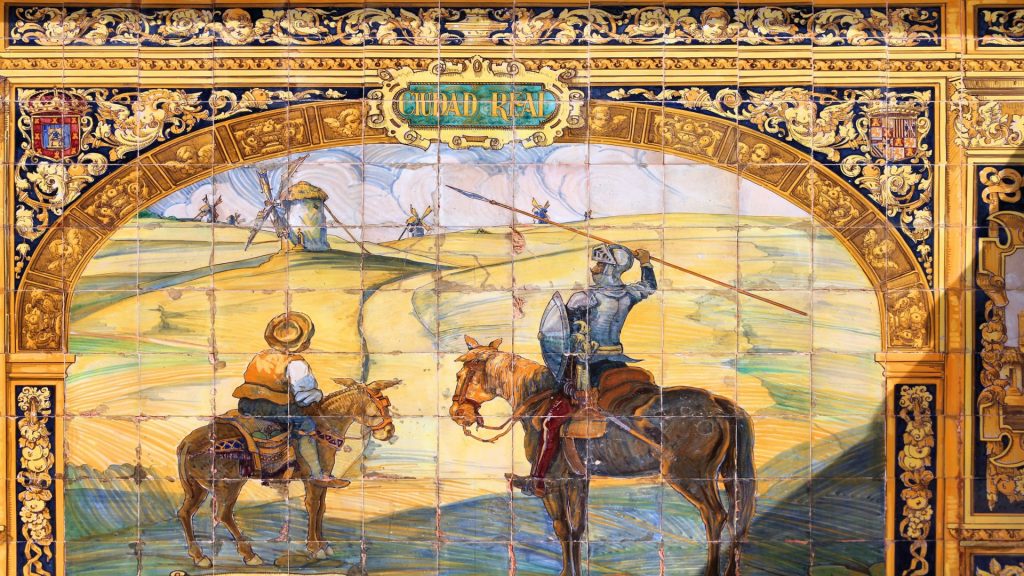
– Do you use Spanish in your daily life or do you plan to use it for your work?
I do use Spanish as part of my teacher training and I intend on using it a lot more when I qualify. Spanish is growing steadily in popularity at schools and this is reflected in the rise in pupils choosing to take it at both GCSE and A levels.
I also use it to read Spanish language newspapers online such as El País, which helps me keep up to date with what is going on.
– Why did you become interested in getting a certificate for Spanish language?
I became interested in doing the DELE certificate really because I wanted to know what my level was and what I needed to improve on. In that respect it was really useful. I also think it is really practical to have a clear goal in mind to focus your studies. That extra bit of pressure helps to structure what you are learning. It is also something more concrete to put on your CV or to talk about at interview.
I was lucky enough to visit the Cervantes Institute headquarters in Madrid last year were I saw some interesting exhibitions about Spanish in the world. It was there that I found out about the DELE exams. It is a fantastic place; if you get the chance to visit, I highly recommend it.
– How did you find the exam?
The exam was like all exams, a bit nerve wracking but completely worth it. You get a good sense of satisfaction once you find out you have passed! I had my speaking at the institute in central London and the other parts at the Cañada Blanch School in Kensington. Everything was seamlessly organised and ran smoothly. All of the staff at the Cervantes were very friendly and professional.
The certificate you get is the most elegant document I have ever seen. It was addressed to “Don William” which made it seem very official but I also it found hilarious!
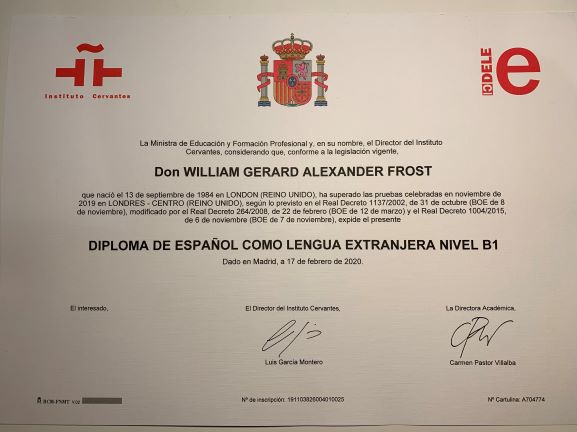
– Do you plan to continue studying Spanish?
I definitely plan to continue studying Spanish, I think it is a wonderful language and I feel like it is the most useful language to be learning right now. Learning in a language is a marathon not a sprint so I am in it for the long haul. It took me ages to remember that piragüismo means canoeing and I recently learned that pencil sharpener is sacapuntas. And I still get a bit confused between ustedes and vosotros, but I’m getting there! You have to keep topping up and refreshing your knowledge as it’s so easy to forget vocabulary! I am also considering taking the DELE B2 or C1 exam next year. ¡Adelante!
The Cervantes Institute has been brilliant in helping me improve my Spanish. But I have also learned about Spanish culture and how the language is used all over the world. At the moment, as travelling is so challenging with the pandemic, all of the online events and resources have been fantastic.
«I am enormously grateful to all at Instituto Cervantes London who conspired to get me over the finish line»
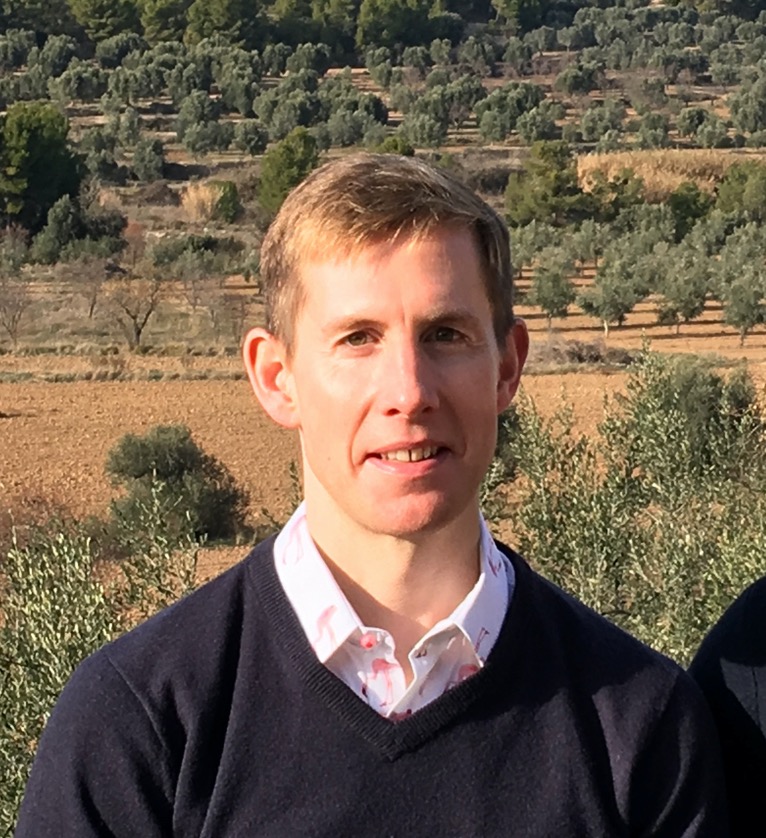
Today we chat with one of our students, Joseph McGowan, who just passed DELE C2 exam and previously achieved DELE C1. Joseph has studied Spanish at Instituto Cervantes in London for a long time and he prepared himself for this exam with our teachers. He enjoys learning Spanish every week and travelling to the beautiful Catalonian town of Sitges.
¿Why did you decide to take DELE exam?
I decided to take the DELE exam, not out of any academic, professional or administrative necessity, but simply as a personal challenge. I wanted to learn Spanish, but I knew I had to have a deadline, otherwise I’d pootle along aimlessly. Procrastination is an art form I’ve mastered, so I needed some impetus to turn the desire to learn into a reality. Also, with years of unstructured learning of French under my belt, I knew that the vague target of «I want to speak a language» can be like trying to reach the end of the rainbow: you never quite get there; there’s always a bit further to go. The feeling you can speak a language successfully comes and goes like the weather, depending on mood, physical state, subject-matter, interlocutor, etc. So I wanted an objective and solid milestone by which to measure my progress.-
How was the preparation? What was the most difficult part for you?
Without doubt, the writing was the most difficult element. I was a terrible schoolboy, never did my homework, didn’t take any further exams after my GCSEs, so once again being faced with The Demon Blank Sheet of Paper waiting to be filled was not only an academic but also a psychological barrier to break through. Fortunately I had a fantastic teacher who was extremely patient and generous with her time and effort. She offered to be my sherpa to guide me up the mountain to the exam. And that mountain certainly did seem steep, and rocky. But once I got there, it was amazing to look back and see how far I’d come.
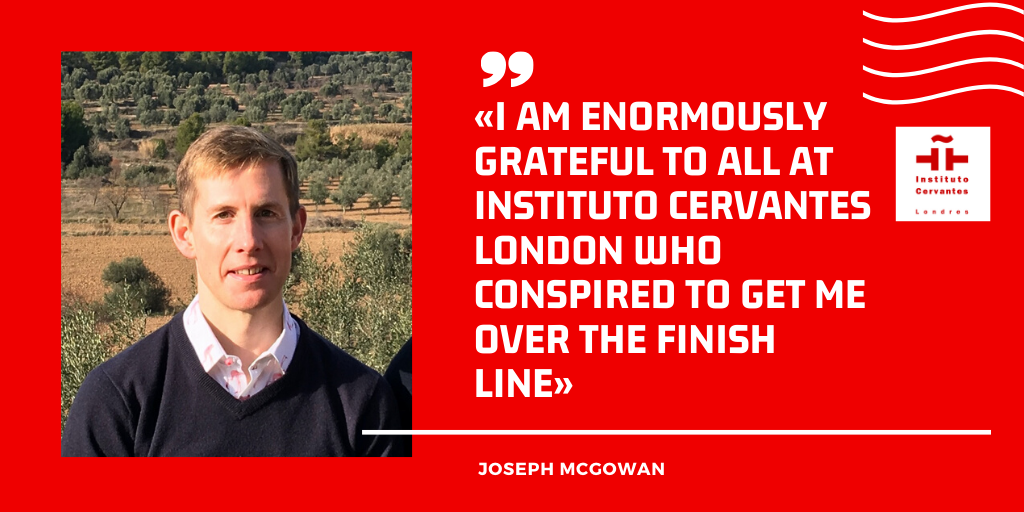
How did the DELE preparation classes at Instituto Cervantes London help you?
As you’ll have gathered, for me the classes were indispensable. Left to my own devices, I could never have passed the C1 and C2 exams. At an advanced level, even in their native tongue, I think someone would struggle to pass a CEFR language exam without preparation. You have to know the format of the exam; for the writing, there are models of text you may not be familiar with; and learning to manage the time in the exam is essential and, at least to me, did not come naturally. My teacher carefully planned each class so there was a progression, which stopped me spending too much time on one particular element at the expense of another. She was there to remind me that you only have to be good enough to pass the exam, there’s no point in trying to exceed the requirements. Of course, perfection is the enemy of good, but it’s sometimes hard to judge alone. In the moments when my determination wobbled and I thought, «Why am I putting myself through this?», I knew I couldn’t let her down and back out now, after we’d both invested so much time and effort.
Looking back, the fact I embarked upon this journey in my 40th year probably isn’t a coincidence. At a time of taking stock of one’s life, it’s not a bad way to live out a mid-life crisis! I am enormously grateful to all at Instituto Cervantes London who conspired to get me over the finish line (twice). The journey is not over, of course — I am now working on Spanish literature with my teacher — but I am very pleased, even proud, to have put those two important milestones behind me.
If you want to take a DELE exam, you can enrol through the online shop of Instituto Cervantes London (CLIC Londres).
These are the upcoming exam sessions at Instituto Cervantes London:
- 11 September (written and oral exam), DELE for Young Learners: Levels A1 and A2/B1
Enrolment deadline 15 July - 11 September (written exam), 11/12 September (oral exam). Level A1, A2, B1, B2, C1, C2
Enrolment deadline 15 July - 13 November (written and oral exam), DELE for Young Learners: Levels A1 and A2/B1
Enrolment deadline 7 October - 14 November (written exam), 13/14 November (oral exam). Levels: A1, A2, B1, B2, C1, C2
Enrolment deadline 7 October
Esta semana en el Instituto Cervantes de Londres / The Week At The Instituto Cervantes London
LUNES 25 DE ABRIL 2016
Comienza nuestro curso crash de español, de lunes a viernes 10-13h y 14-17h.
MARTES 26 DE ABRIL 2016
Una charla para entender mejor el pasado de España – Manuel Calzada: «Entre la Inquisición y el aplauso. Los Entremeses de Cervantes y la censura en la Edad de Oro española»

MIÉRCOLES 27 DE ABRIL 2016
En Central Picturehouse, en el marco del ciclo Nuevo Documental Europeo, se proyecta el documental «Bugarach«, seguido por un turno de preguntas y respuestas con el realizador Salvador Sunyer.
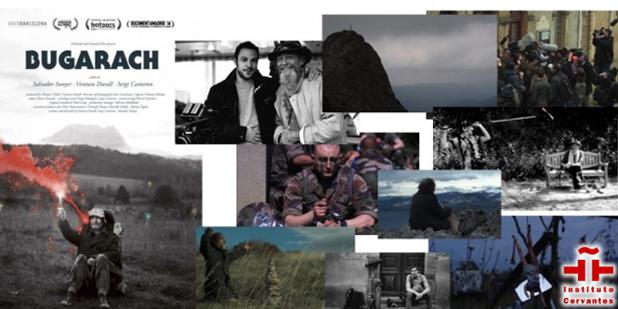
________________________
Siempre puedes consultar toda nuestra oferta trimestral de cursos, tanto para alumnos como para profesores, en nuestro programa académico de primavera, y conocer la cultura del mes en el programa de cultura de abril.
MONDAY 25 APRIL 2016
First day of our Spanish crash course for beginners, Monday to Friday 10am – 1pm and 2pm – 5pm.
TUESDAY 26 APRIL 2016
A talk to delve deeper into the past of Spain – Manuel Calzada: Between Inquisition And Applause. Cervantes’s Entremeses And Censorship In Golden Age Spain
WEDNESDAY 27 APRIL 2016
At Central Picturehouse and part of the New European Documentary series, we recommend the screening of the documentary «Bugarach«, followed by a Q&A session with filmmaker Salvador Sunyer.
________________________
You can always find our complete course offer for students, as well as all teacher training, through late June 2016, in our spring course programme, and see this month’s cultural activity in our April cultural programme.
Esta semana en el Instituto Cervantes de Londres / The Week At The Instituto Cervantes in London
LUNES 18 ABRIL 2016
Comienza el curso intensivo de español para niveles A1 y A2, de dos semanas de duración
__________________
Comienza el curso de español en línea AVE Global de 10 semanas de duración, para niveles de A1 a B1, con apoyo de un tutor
__________________
Comienza el curso en línea para preparadores y examinadores DELE A1 y A2

_____________________________________
MARTES 19 ABRIL 2016
«Joaquín Rodrigo: Voice and Vision» – presentación de libro biográfico sobre el compositor hispano más destacado del sXX, con la presencia de los autores Raymond Calcraft, Elizabeth Matthews y la condesa Cecilia Rodrigo, así como la soprano Catherine Hamilton, el violinista Agustín León, el guitarrista Pepe Romero y el actor Gabriel Woolf.
_____________________________________
JUEVES 21 ABRIL 2016
Guitarrísimo: «Cervantes y su bigüela» – Alfred Fernández interpretará una selección de música del sXVI español en la vihuela
_____________________________________
VIERNES 22 ABRIL 2016
Comienza el curso de gramática para profesores de español, sesiones los viernes
_____________________________________
SÁBADO 23 ABRIL 2016
Comienza el curso de gramática para profesores de español, sesiones los sábados
_____________________________________________________________________________
_____________________________________________________________________________
MONDAY 18 APRIL 2016
First day of the 2-week long Intensive Spanish course for beginners (levels A1 and A2)
__________________
First day of the 10-week long AVE Global online Spanish course with tutor support, for levels A1 to B1
__________________
First day of the online course for DELE A1 and A2 tutors and examiners

_____________________________________
TUESDAY 19 APRIL 2016
Launch of Joaquín Rodrigo: Voice And Vision – the book that looks at the life of the most prominent Hispanic composer of the twentieth century. We will be joined by its authors Raymond Calcraft, Elizabeth Matthews and Countess Cecilia Rodrigo, as well as soprano Catherine Hamilton, violinist Agustín León, guitarist Pepe Romero and actor Gabriel Woolf.
_____________________________________
THURSDAY 21 APRIL 2016
Guitarrisimo: «Cervantes and his bigüela» – Alfred Fernandez will perform a selection of 16th-century Spanish vihuela music.
_____________________________________
FRIDAY 22 APRIL 2016
First day of the grammar course for Spanish teachers, sessions on Fridays
_____________________________________
SATURDAY 23 APRIL 2016
First day of the grammar course for Spanish teachers, sessions on Saturdays
Learn Spanish with The Independent
 Cactus’ Language Minis is a Spanish podcast series, developed to offer easy learning on the go. It consists of seven levels, each with 10 downloadable podcast lessons and PDF workbooks, which take you from beginner through to advanced level. The Language Minis series is designed to help you increase your understanding of the Spanish language and equip you with language skills for use in everyday situations.
Cactus’ Language Minis is a Spanish podcast series, developed to offer easy learning on the go. It consists of seven levels, each with 10 downloadable podcast lessons and PDF workbooks, which take you from beginner through to advanced level. The Language Minis series is designed to help you increase your understanding of the Spanish language and equip you with language skills for use in everyday situations.
